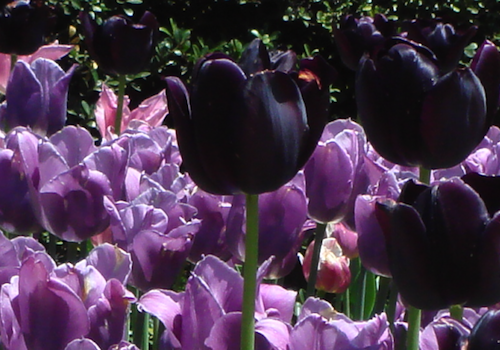Amy De'Ath and the Determined Tulips

Amy De'Ath, a young poet from Suffolk who now studies at Simon Fraser University in Vancouver, is given her due in this short essay at Bebrowed's Blog (the writer was evidently inspired by the inclusion of De'Ath's poems in the recent Claudius App). For now, let's talk determined tulips (have we just got flowers on the brain? Happy Valentine's Day, btw):
In Chris Goode’s introduction to the ‘Better than Language’ anthology he concedes that several of the important younger poets have been admitted and rightly points out that readers will have a list of those who should also have been included. My personal and highly subjective list has Emily Critchley, Luke Roberts and Amy De’ath competing for first place but for entirely different reasons apart from the fact that they are all very very good.
These four poems indicates a degree of control that’s more advanced than most of De’Ath’s peers. I get a very strong sense of poems that are in charge of themselves and know where they are going, there’s also an enviable degree of skill with language. In order to show what I mean I want to focus on ‘Heaven’ and ‘You Win’ because they’re both long enough to show how this control is sustained.
On the first and second readings of ‘Heaven’, I had a problem with the road signs, the melon factory, the vole and the tulips because these appeared to be selected for their oddness alone. However I’m now beginning to see the point because heaven in this sense refers to a separate dream-like world more than it does to a perfect one although the poem seems to assume that we aspire to the ideal too.
The inclusion of the tulips does however throw up a number of questions:
1.What are the tulips determined to do?
2.How does a tulip show that it is determined?
3.If the tulip’s have emerged from ‘heaven’s side door’ then which planet is it that they are marching to the figurative edge of?
4.Are we meant to assume that the planet is our own?
5.Why did only some of the tulips leap of the edge of the planet
6.What did the others lean into or against?
7.Were the tulips, like bad angels, expelled from heaven or did they leave of their own accord?
8.How does a tulip (determined or not) get to be in heaven?None of these queries are intended as part of a quest for deeper understanding but it does illustrate the kind of processes that this material can initiate. The same sorts of questions can be asked about the appetite of roads signs and the slewing of melon juice but I want to try to concentrate on the effect of the poem as a whole. We start with the poet setting off to heaven but the last line of the in initial paragraph suggests that this may have been a dream. The keeping of stollen for emergencies whilst burning up is excellent as is the love that thrusts and yelps. We’re also given indications that mistakes will be made with the language (spirituals/forest, revolving faithful).
The personification of heaven as male and the idea that writing artlessly is a ‘measure of his talent’ is intriguing as the writing here does at times affect to be artless. Anyone who’s tried to write in this way will know that it does require a lot of talent to get it right.
Indeed, and we wonder if a connection could be made regarding artlessness to the Jennifer Moore paper on aesthetics of failure that we mentioned yesterday. Pick up De'Ath's recent Bad Press chapbook, Caribou. As Cathy Wagner said of it: "...this poetry knows its game too well not to bash the balls off the table."
And listen to Amy's "Epigraph, Just Handcuff Me Heaven, You Win," here.


